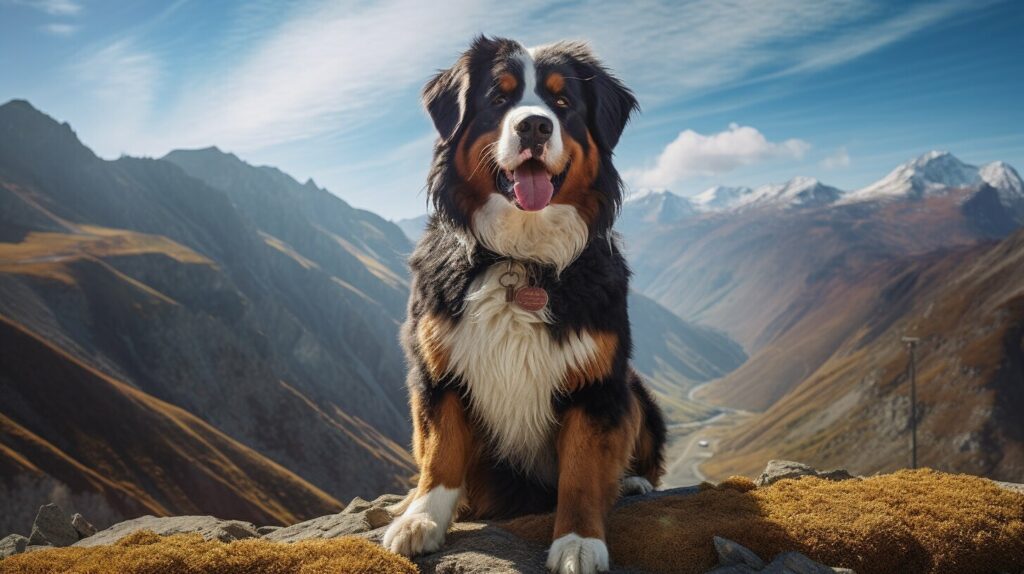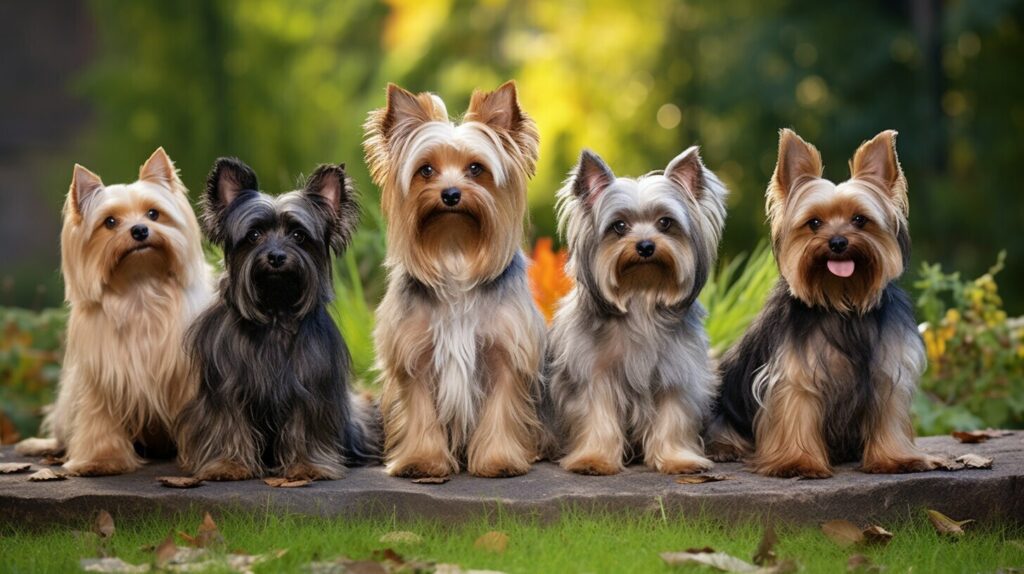Are you looking for a loyal and friendly companion? Look no further than the Bernese Mountain Dog breed. These dogs are beloved for their gentle nature and make wonderful family pets. In this guide, we will explore their history, characteristics, care needs, training, and health issues. By the end of this guide, you’ll have a comprehensive understanding of what it takes to care for a Bernese Mountain Dog.
Key Takeaways:
- Bernese Mountain Dogs are known for their gentle nature and make great pets for families.
- This guide will cover their history, characteristics, care needs, training, and health issues.
- By the end of this guide, you will have a comprehensive understanding of what it takes to care for a Bernese Mountain Dog.
The History and Origins of Bernese Mountain Dogs
Bernese Mountain Dogs, or Berners as they are affectionately known, are a large breed of dog that originated in the Swiss Alps. They were bred for farm work, including pulling carts and herding livestock. The breed is believed to have descended from the Roman Molossian dogs, which were used in battle. Berners were first recognized as a breed in Switzerland in 1907 and were later introduced to the United States in the 1920s.
Bernese Mountain Dogs have a rich and fascinating history. They were originally bred in the Canton of Bern, Switzerland, which is where the breed gets its name. The breed was used as a general purpose farm dog, helping with herding, guarding, and pulling carts. Berners were also known for their ability to traverse the snowy Swiss Alps to deliver goods to remote mountain villages.
During the 1800s, the breed nearly went extinct due to increased mechanization of farming and a decline in demand for large working dogs. Fortunately, a group of breed enthusiasts worked to preserve the breed, and their efforts paid off. Today, Bernese Mountain Dogs are beloved family pets and continue to work as therapy dogs, search and rescue dogs, and in various other service roles.
Bernese Mountain Dog Breed Standards and Characteristics
When it comes to Bernese Mountain Dog breed standards, these dogs are known for their large size and distinctive tri-colored coats. They typically weigh between 70 and 115 pounds and stand at 23-28 inches tall at the shoulder. Bernese Mountain Dogs have a strong and sturdy build with a broad head, dark eyes, and a friendly expression.
Their thick, double coat is silky to the touch and can be black with rust and white markings. The Bernese Mountain Dog’s coat requires regular brushing to maintain its softness and shine, as well as to prevent mats and tangles.
One of the most appealing Bernese Mountain Dog characteristics is their gentle and loving temperament. They are known for their affectionate nature towards their family members and are particularly good with children. These dogs are also loyal and protective, making them excellent watchdogs.
In addition to their friendly nature, Bernese Mountain Dogs are intelligent and are quick learners. They are known for their willingness to please their owners and respond well to positive reinforcement training methods.
It’s important to note that Bernese Mountain Dogs thrive on social interaction and can become anxious or destructive if left alone for extended periods of time. These dogs require daily exercise and mental stimulation to keep them happy and healthy.
Caring for Bernese Mountain Dogs: Essential Tips
Bernese Mountain Dogs are a beloved breed known for their sweet nature and loyalty. Providing your Bernese Mountain Dog with proper care is essential to promoting their health and happiness. Here are some essential tips:
Grooming
Brush your Bernese Mountain Dog’s coat at least once a week to prevent matting and promote healthy skin and coat. Bathe them every two to three months with a gentle dog shampoo. Trim their nails regularly to prevent discomfort and injury.
Exercise
Bernese Mountain Dogs have moderate exercise needs. Aim for at least two walks or play sessions per day. Avoid strenuous exercise or activity during periods of extreme heat or cold.
Diet
Provide your Bernese Mountain Dog with a balanced and nutritious diet appropriate for their age and activity level. Avoid overfeeding, as Bernese Mountain Dogs are prone to obesity.
Veterinary Care
Regular veterinary check-ups are essential for maintaining your Bernese Mountain Dog’s health. Be sure to keep up with recommended vaccinations and preventive care, such as heartworm prevention.
Overall Well-being
Pay attention to your Bernese Mountain Dog’s emotional well-being. Provide plenty of opportunities for socialization and play. Ensure they have a comfortable and safe living environment, with access to fresh water and shade.
By following these essential tips for Bernese Mountain Dog care, you can ensure your furry friend lives a happy and healthy life.
Training the Bernese Mountain Dog: Best Practices
Training your Bernese Mountain Dog is vital to ensure they grow up to be well-mannered, obedient, and a joy to be around. With their eager-to-please temperament, Bernese Mountain Dogs are generally easy to train, but it still requires patience, consistency, and positive reinforcement.
Start training your Bernese Mountain Dog as early as possible, preferably within the first few weeks of bringing them home. Early socialization with people and other dogs is crucial to prevent any potential behavioral issues later on.
Bernese Mountain Dogs respond well to positive reinforcement training, which involves rewarding good behaviour and ignoring bad behavior. Avoid using punishment or physical force, as it can damage your bond with your dog and lead to long-term behavior issues.
Consistency is key when it comes to training your Bernese Mountain Dog. Establish a routine with clear rules, and stick to it. Provide plenty of praise and treats for good behavior. With time and consistency, your Bernese Mountain Dog will learn to follow your commands and develop a deep bond with you.
It’s also essential to keep training sessions short, around 10-15 minutes, and to avoid getting frustrated or angry if your dog is not responding as expected. Take breaks if needed, and always end each session on a positive note.
Training your Bernese Mountain Dog can be a fun and rewarding experience for both you and your furry friend. With positive reinforcement, consistency, and patience, your Bernese Mountain Dog will grow up to be a happy, well-trained companion that brings joy to your life.
Bernese Mountain Dog Puppies: What You Need to Know
If you’ve decided to bring a Bernese Mountain Dog puppy into your home, there are a few things you should know to ensure a healthy and happy life for your new companion. Here are some essential tips:
Finding a Reputable Breeder
When searching for a Bernese Mountain Dog breeder, it’s important to ensure that they are reputable and ethical. Look for breeders who provide health clearances for their breeding dogs and are willing to answer any questions you may have. You can also search for breeders through the American Kennel Club or the Bernese Mountain Dog Club of America.
Selecting a Healthy Puppy
When choosing your Bernese Mountain Dog puppy, look for one that is alert, playful, and curious. Check that their eyes, ears, and nose are clean and free from discharge. The puppy’s coat should be shiny and free from any bald spots or skin irritations. A healthy puppy should have a good appetite and a clear bill of health from a veterinarian.
Early Puppy Care
It’s important to establish good habits and routines early on in your puppy’s life. Introduce them to a daily schedule for meals, exercise, and playtime. Begin socialization training as soon as possible to help your puppy become comfortable with different environments and people. This will help them develop into a well-adjusted adult dog.
Puppy Training
Bernese Mountain Dogs are highly trainable and respond well to positive reinforcement methods. Start training early with basic commands such as sit, stay, and come. Consider enrolling your puppy in a puppy training class to help them learn good behavior and socialization skills.
Creating a Safe Environment
Make sure your home is safe and secure for your new puppy. Remove any hazardous items and create a designated space for them to sleep and relax. Provide plenty of toys and mental stimulation to keep them entertained and prevent destructive behavior. Consider crate training to help with potty training and to give your puppy a safe space to retreat to.
Conclusion
Bringing a Bernese Mountain Dog puppy into your home can be a wonderful experience. With proper care, training, and socialization, your puppy will grow into a loyal and loving companion for years to come. Remember to choose a reputable breeder, provide early and consistent care, and establish a safe and stimulating environment. Enjoy the journey of raising your Bernese Mountain Dog puppy!
Common Health Issues in Bernese Mountain Dogs
While Bernese Mountain Dogs are generally a healthy breed, they are prone to some health issues that potential owners should be aware of.
Hip and elbow dysplasia is a common condition that affects many large breeds, including Bernese Mountain Dogs. This condition occurs when the joints do not develop properly, leading to pain and discomfort for the dog. Regular exercise and a healthy diet can help prevent this condition, but it is important to have a veterinarian assess your dog’s joint health regularly.
Bloat is a serious condition that can be life-threatening if not treated promptly. This occurs when the stomach fills with gas, food, or fluid, and then twists, cutting off blood flow to the stomach. Signs of bloat include restlessness, pacing, drooling, and a distended stomach. If you suspect that your Bernese Mountain Dog is experiencing bloat, seek veterinary care immediately.
Cancers such as mast cell tumors and osteosarcoma are more prevalent in Bernese Mountain Dogs than in other breeds. Regular check-ups and cancer screenings can help catch these diseases early on, increasing the likelihood of a positive outcome.
By staying informed about these common health issues and working closely with your veterinarian, you can help ensure that your Bernese Mountain Dog lives a happy, healthy life.
Enjoying Life with a Bernese Mountain Dog: Activities and Bonding
Bernese Mountain Dogs are known for their friendly and loving temperament, making them fantastic companions for a variety of activities. Whether you’re looking for outdoor adventures or indoor bonding time, there are plenty of ways to enjoy life with your Bernese Mountain Dog.
One of the best ways to bond with your Bernese Mountain Dog is through exercise. These dogs are known for their love of the great outdoors, and they require regular exercise to keep them healthy and happy. Hiking and walking are great activities to do with your Bernese Mountain Dog, as they love to explore and take in new sights and smells. Just be sure to keep them on a leash, as their friendly nature can sometimes lead them to approach strangers or other animals.
Training your Bernese Mountain Dog is also a great way to bond and spend time together. These dogs are highly trainable and eager to please, so positive reinforcement methods work well. Obedience training, agility training, and even tricks can all be fun activities to do with your dog. Just be sure to keep training sessions short and fun, as Bernese Mountain Dogs can get bored easily.
In addition to exercise and training, there are plenty of other activities that you can enjoy with your Bernese Mountain Dog. Dog sports, such as flyball or dock diving, are great ways to challenge your dog physically and mentally. If your dog is more laid back, snuggling up on the couch for some quality bonding time can be just as enjoyable. Bernese Mountain Dogs love to be part of their family’s activities, so whatever you do together, they will be happy to join in.
When enjoying life with your Bernese Mountain Dog, it’s important to remember their care needs. These dogs have a thick coat that requires regular grooming to prevent matting and keep it healthy. They also need a well-balanced diet and regular veterinary care to maintain their overall health and well-being. By keeping up with their care needs, you can ensure that you have many happy years of adventures and bonding with your beloved Bernese Mountain Dog.
Conclusion
Congratulations, you have reached the end of your guide to Bernese Mountain Dogs. This breed is truly one of a kind, with a charming and gentle nature that makes them a perfect addition to any family. Throughout this article, you have learned about their history, characteristics, and care needs, which will help you provide the best possible life for your furry companion.
Remember to prioritize regular veterinary care, socialization, and positive reinforcement training to ensure that your Bernese Mountain Dog is healthy, happy, and well-behaved. They are known for their love of outdoor activities, so be sure to take advantage of their adventurous side and include them in your hiking, obedience training, or dog sports.
In conclusion, Bernese Mountain Dogs are a fantastic breed that will bring joy and companionship into your life. We hope that this guide has given you the information you need to make an informed decision about bringing one into your home. So go ahead, embrace the charm of Bernese Mountain Dogs and enjoy a lifelong bond with your new furry friend!
FAQ
Q: What are the key characteristics of Bernese Mountain Dogs?
A: Bernese Mountain Dogs are known for their friendly and gentle nature. They have a large and sturdy build, with a thick coat that comes in black, tan, and white colors. They are highly intelligent and trainable, making them great family pets.
Q: How much exercise do Bernese Mountain Dogs need?
A: Bernese Mountain Dogs are an active breed and require daily exercise to stay healthy and happy. They should have a minimum of 30 minutes to an hour of exercise each day, which can include walks, playtime, and mental stimulation.
Q: What are the common health issues in Bernese Mountain Dogs?
A: Some common health issues in Bernese Mountain Dogs include hip and elbow dysplasia, bloat, and certain types of cancers. It is important to schedule regular veterinary check-ups and follow preventive measures to ensure their well-being.
Q: Are Bernese Mountain Dogs good with children?
A: Yes, Bernese Mountain Dogs are generally good with children. They are known for their gentle and patient nature, making them excellent family pets. However, supervision is always recommended when young children are interacting with any dog breed.
Q: How should I groom my Bernese Mountain Dog?
A: Bernese Mountain Dogs have a thick and double coat that requires regular grooming. Brushing their coat two to three times a week will help prevent matting and keep their fur healthy. They may experience heavy shedding twice a year, during which more frequent brushing is advisable.
Q: Can Bernese Mountain Dogs live in apartments?
A: While Bernese Mountain Dogs can adapt to apartment living, they require ample space and regular exercise to thrive. If living in an apartment, it is important to provide them with daily walks and access to outdoor areas for playtime.
Q: Are Bernese Mountain Dogs prone to separation anxiety?
A: Bernese Mountain Dogs are known for their strong bond with their owners and may experience separation anxiety if left alone for long periods. It is important to gradually train them to be comfortable with alone time and provide mental stimulation when they are alone.
Q: How long do Bernese Mountain Dogs typically live?
A: On average, Bernese Mountain Dogs have a lifespan of 6 to 8 years. However, with proper care, regular veterinary check-ups, and a healthy lifestyle, some Bernese Mountain Dogs may live longer.
Q: Do Bernese Mountain Dogs require special training?
A: Bernese Mountain Dogs are intelligent and eager to please, which makes them relatively easy to train. However, early socialization and positive reinforcement training methods are recommended to ensure they develop good manners and behavior.
Q: Can Bernese Mountain Dogs be left alone for long periods?
A: Bernese Mountain Dogs thrive on human companionship and may become anxious if left alone for long periods. If you anticipate being away for extended periods, it is important to arrange for someone to provide them with care and companionship.



